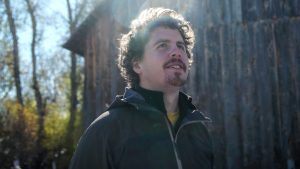
Zach Weiss always wanted to do something that would help to heal the earth, but it wasn’t until he met Austrian farmer Sepp Holzer that he found his path. Holzer had taken a marginally productive farm in a region so cold that they called it the “Austrian Siberia,” and transformed it into a lush and healthy landscape, rich with food, water, and wildlife. Weiss studied with Holzer and now works all over the world helping agrarians to restore natural flows on their land, increasing water for crops and livestock, but also for wildlife and downstream water users. And a restored water cycle means cooler ground temperature and natural heat dissipation, which, if implemented at scale, can have a major impact on global warming mitigation.
Weiss and his team are launching an educational site and water community at Water Stories, where people can get involved in learning about how they can restore water at any scale, from an urban or suburban yard, to a giant ranch, to a post-industrial reclamation site.
2’27 mentored by Sepp Holzer
2’48 Garden of Eden on earth
3’17 growing biodiverse crops and harvesting the crops that do the best––and returning the rest to nature
3’53 techniques for holding water and infiltrating it into soil
4’45 water restoration in dry landscapes
5’31 area in Portugal went from a dry landscape to an abundant agricultural community
6’27 it’s not so much about how much rain you get but how it cycles and how many times you use it
9’58 when you destroy the temperature, you destroy rain cycles
10’29 land with vegetation on it balances out flood, drought, and temperature
11’02 cooler ground absorbs more water
11’54 low tech work––shovels, some big equipment
13’02 some water restoration projects require very little maintenance––they can last until the next ice age
13’34 designing according to the principles of nature
14’15 example of Oregon farm Tabula Rasa going from no water to a rich water landscape and educational center
15’41 tying hydrology into the natural veins and recharging those natural water ways
16’06 beaver mimicking structures
16’43 “decentralized” small dams––and the problem with bigger dams
17’53 the importance of managing the water cycle for water supply throughout the year
19’19 we will never fully understand natural systems, so we work with nature instead of fighting it with our incomplete knowledge
20’08 Dr. Rajendra Singh––doctor who revived an entire region of Rajasthan
by restoring the water cycle
21’18 the many benefits of reviving the landscape with water––including reverse migration from the cities
22’35 Singh punished rather than rewarded for his work because it made communities independent and harder to control
23’46 many other agrarians doing water restoration are punished by an antiquated legal system that doesn’t understand how water works
24’29 the relationship between catastrophic fires and the water cycle
25’18 Peter Marshall in Australia restored a former mining site into healthy forest
25’51 that forest resisted wild fires that destroyed all the surrounding land
26’29 the use of willow trees as fire retardants
26’52 willows more effective than fire trucks
27’03 “railway poplars” protected railroads
28’41 the potential for climate change mitigation
29’22 we’ve desertified 1/3 of earth’s land in 10,000 years…and it can be reversed
30’12 every small urban lot can contribute to restoring the land and water cycle
31’12 rain gardens can make a difference even in a small place
31’43 lawns aren’t great…better to have multiple plants and trees
32’05 rocks on the ground aren’t nearly as good as plants
32’21 reducing heat island effect
32’57 waterstories.com
33’16 bringing people stories of water, and teaching people to restore water on the land
33’38 creating new narrative of people as creators, not just destroyers
34’13 you can see results very quickly
35’22 water privatization is the biggest barrier to restoring the water cycle
35’35 water would not be lucrative in a world where there is abundant water
35’57 government follows more than it leads––people do the projects and the government do the right thing retroactively
36’48 positive effect on farmers’ and ranchers’ profits
37’46 water is the ultimate capital and it can be farmed
38’23 water projects pay for themselves quickly
39’07 a lot of young people want to go into this work––but it’s not taught in envirnmental engineering courses
40’15 this is not about “hope”––there’s a clear, proven pathway to getting this work done and having a healthy, moist, cool earth



Subscribe:
Apple Podcasts
Spotify